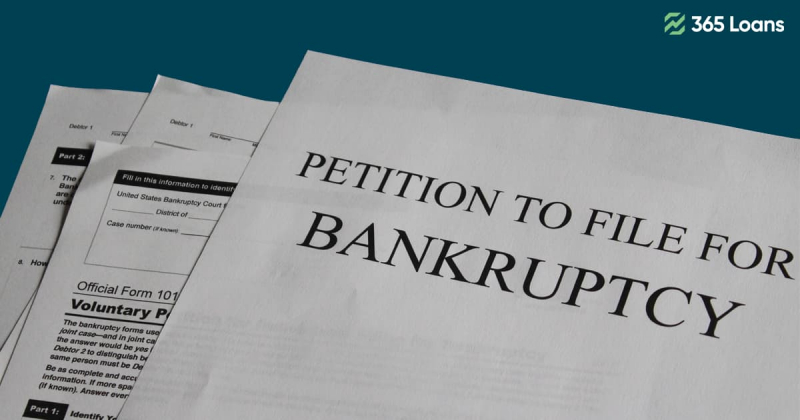It can be hard to find a route out of debt if it has become all-consuming. Perhaps you do not have a clue as to how to deal with your financial obligations. You may have gotten yourself into a sticky situation and cannot see your way out. It is understandable if bankruptcy is on your mind.
When you are up to your eyeballs in debt, deciding whether or not to declare bankruptcy can feel like an insurmountable task. If you are having trouble sleeping because of money worries, declaring bankruptcy is a nice way to start over. Think carefully about the consequences of filing for bankruptcy.
What Happens After You File for Bankruptcy?
Laws governing personal bankruptcies have been in effect for close to 150 years. These federal statutes aim to provide debtors with a second opportunity if they have hit hard times and are unable to meet their financial obligations.
Large and small firms alike can seek bankruptcy protection under existing law. A company or partnership may, for instance, seek protection under Chapter 11 of the Bankruptcy Code in order to restructure its debts.
Individuals or married couples who are having financial difficulties may seek relief by filing a bankruptcy petition with the bankruptcy court, either on their own or with the help of an attorney. In the United States, bankruptcies are handled exclusively by federal courts, and the filing of a bankruptcy case results in an automatic stay that prevents creditors from taking any further action to collect on any obligations.
Bankruptcy judges in the United States examine petitions for bankruptcy and make rulings on whether or not debtors are eligible for a discharge of their debts.
The bankruptcy process can vary slightly from case to case, depending on the type of bankruptcy you file. No matter what kind of bankruptcy you apply for, a judge will compel you to undergo credit counseling and debtor education provided by a certified credit repair agency before discharging your debts.
Chapter 7 vs. Chapter 13 Bankruptcy: An Overview
Chapter 7 and Chapter 13 bankruptcy are the most popular forms of individual bankruptcy in the United States. If you are to file for bankruptcy, you will be going for one of these two most common types.
Chapter 7 Bankruptcy
A bankruptcy trustee appointed by a U.S. court will sell any non-exempt assets to satisfy the debtor’s unsecured creditors in a Chapter 7 bankruptcy. Except for your primary residence and your vehicle(s), creditors can take whatever you own and sell it to pay off your debt. Real estate that is not your principal residence, investments outside of retirement accounts, and high-value pieces of jewelry or art are all examples of non-exempt assets.
For this reason, Chapter 7 is sometimes known as “liquidation bankruptcy,” as all of your non-exempt assets will be sold to repay your debts. A Chapter 7 claimant must show evidence that they are extremely low-income, however. You may not be able to apply for Chapter 7 bankruptcy if you do not qualify.
Chapter 13 Bankruptcy
A Chapter 13 bankruptcy filing is an option for those who do not meet the requirements for a Chapter 7 bankruptcy. Your assets will not need to be sold off as part of this bankruptcy procedure. Instead, a court-ordered payment plan of three to five years duration will be established by this filing. If you still owe money after fulfilling the terms of your repayment plan, you may be able to get it discharged in bankruptcy.
Pros and Cons of Filing Bankruptcy
Bankruptcy is a legal option that might provide relief for persons who can no longer keep up with their debts. While this approach can remove an overwhelming financial strain, there are benefits and drawbacks to filing for bankruptcy. To give just one example, while bankruptcy can give you a clean slate, it can also make it difficult to obtain new types of credit in the future.
The choice to file for bankruptcy should be studied carefully, examining not just the benefits and the possible relief it might provide but also the drawbacks. So, what are the benefits and downsides of filing for bankruptcy?
5 Advantages of Filing for Bankruptcy
Although bankruptcy is generally seen negatively, it may lead to positive results. If you have been granted a fresh start, you could decide that you are now ready to take control of your financial situation.
- You can simplify your financial situation.
When money is tight, it can feel impossible to keep up with debt payments. Filing for bankruptcy might help with debt by reducing the total amount owed. It is possible to have your name removed from the debt books on occasion. This depends on the type of filing you choose.
- You may keep your possessions.
In Chapter 7 and Chapter 13 bankruptcies, the debtor is allowed to preserve certain property (including a home, automobile, and retirement funds) under the terms of the bankruptcy plan. If you are unsure of what property may be at risk and what is exempt under the laws of the state in which you reside, you should get professional advice.
Filing for Chapter 7 bankruptcy does not guarantee you will keep any of your property, while it may safeguard specific assets depending on the details of your case. If you have significant assets, such as a home, Chapter 13 bankruptcy is typically the best alternative.
- You can quickly file for and complete a Chapter 7 bankruptcy case.
Which bankruptcy option you choose will determine how long it takes for your case to be resolved. When filing for Chapter 7 bankruptcy, the process usually takes less than six months to conclude. That means you may get your credit back on track in no time. In contrast, the Chapter 13 repayment plan might drag on for years.
- Your creditors will cease trying to collect from you.
When you declare bankruptcy, your debt collectors are legally obligated to stop contacting you. Creditors cannot harass you once you file for bankruptcy and until your debt is discharged. However, not all debts are discharged in bankruptcy, so if you are still being harassed for an ongoing obligation, you should look into whether or not you’re still legally obligated to pay it.
- You can get a fresh start.
Filing for bankruptcy allows you to start over financially when you have exhausted all other options and are drowning in debt. Filing for bankruptcy can help you get rid of or significantly reduce your debt and, in most cases, completely eliminate it. To go back on the right track financially, sometimes all you need is a new start.
8 Drawbacks of Bankruptcy
Bankruptcy has the potential to aid you in a difficult financial position, but it can also have disastrous effects on your future. Filing for bankruptcy should only be done after all other debt-relief alternatives have been exhausted. If you are thinking of doing it, weigh the pros and cons carefully.
- Your credit rating will plummet.
Your credit score may already be low if you have been months or even years behind on payments, but a bankruptcy filing can do even more damage. The more accounts reported in your bankruptcy filing, the higher the impact on your credit score. In addition, depending on the chapter you file under, bankruptcy might remain on your credit report for seven to ten years.
- Your ability to obtain credit may become more difficult in the future.
If you have filed for bankruptcy, you may have to live under a shadow of a doubt for up to ten years. Creditors will be wary of working with you if you have a bankruptcy on your credit report. Possible consequences include being denied a mortgage, auto loan, or even a credit card in the future.
- Not all debts can be discharged in bankruptcy.
There is a common misunderstanding that filing for bankruptcy releases one from all present and future financial obligations. But not all debts can be included in bankruptcy files, even though doing so can help get rid of unsecured debt like personal loans, medical bills, or credit card debt.
For example, school loans and secured debt are usually still your responsibility when you file. Furthermore, alimony payments cannot be eliminated through the bankruptcy process. So, you might still have to deal with debt even after filing for bankruptcy. Therefore, filing for bankruptcy may not be beneficial, depending on the type of debt you are struggling with.
- Potential for property repossession.
Your assets are sold to pay off your outstanding debt, when you declare Chapter 7 bankruptcy. That implies your debt collectors could take practically everything you own as collateral. While a repayment plan in Chapter 13 will prevent repossession of your property, for the time being, failure to comply with the court’s orders could result in the property being repossessed.
- It may challenge you to be eligible for filing bankruptcy.
You will have to prove you cannot afford to repay your debt, if you are declaring Chapter 7 bankruptcy. Make sure your yearly income is low enough to qualify for bankruptcy by taking this test. If it is not, then your ability to pay back your debt will be measured against your discretionary income after mandatory payments have been deducted (such as rent and child support). Not everyone has enough debt to pursue bankruptcy.
- Finishing the procedure may take a long time.
A court-ordered repayment plan under Chapter 13 bankruptcy could stretch over several years if you are successful in having your case heard. Most Chapter 13 filings take between three and five years to finish making payments.
- Your cosigners may be responsible for your debts.
While cosigners can help you acquire a loan with a cheaper interest rate or receive a credit card, these folks are taking on a significant responsibility. If you fail to repay a debt for which someone else has been a cosigner, it will severely damage both of your credit records. Furthermore, even after a bankruptcy is filed, they are still liable for any unsecured debt in their name.
- Bankruptcy does not come cheap.
You can end up spending hundreds, if not thousands, of dollars on things like bankruptcy and legal representation. More than $300 is required for both Chapter 7 and Chapter 13 filings (though these fees are sometimes reduced), and the expense of hiring a bankruptcy counsel can easily reach the thousands. Keep in mind that even after you declare Chapter 13, you will still be making payments on your debts according to your new repayment plan.
Getting Out Of Debt Without Bankruptcy
Bankruptcy should be filed only after all other options have been exhausted. If you look into your options, you might be able to stay out of bankruptcy.
- Reduce your debt by merging your accounts.
Simply put, debt consolidation is the process of merging many obligations into a single payment. Most people who consolidate their debts use a new loan to pay off their existing debts, reducing their repayment obligations to just one.
In addition to making it simpler for you to make monthly payment commitments, a debt consolidation loan may also provide you with a reduced interest rate. Credit card debt might be made more manageable with the help of a debt consolidation loan because it could result in a cheaper interest rate.
- Settle your financial obligations.
Through debt settlement, you and your creditors or debt collection agency come to an agreement on a reduced payment that will satisfy your debt. This can be a win-win outcome since you eliminate your debt while your debtor gets a portion of their money back.
Credit card and medical bill debts, as well as private education loans and unsecured personal loans, are all eligible for debt settlement. Contacting your creditor directly is one option for settling your debt, but you may also use a debt settlement company to help you negotiate the conditions of your settlement.
- Manage your debt.
Simply put, debt management entails formulating a strategy for paying off debt or employing a service to do so on your behalf. Debt management can also involve haggling with creditors on reduced interest rates, monthly payments, or the overall amount owed.
To avoid bankruptcy and begin repaying your debts, a debt management company might be of great assistance. To ensure the plan’s success, though, it will demand your dedication and hard work.
Credit card, medical, and other unsecured debts may all be manageable with the assistance of a debt management firm. However, most companies will first review your debt, income, and finances to confirm your eligibility for their plans.
Frequently Asked Bankruptcy Questions
Do you think bankruptcy has any positive outcomes?
In some cases, discharging debts through bankruptcy might be advantageous. The benefits of filing for bankruptcy under Chapter 7 or Chapter 13 include debt consolidation or discharge, keeping your home, car, and retirement money, and stopping collection efforts. Filing for bankruptcy, however, has negative consequences, such as a lower credit score and a more challenging time getting loans in the future.
What are the potential negative outcomes of declaring bankruptcy?
In some types of bankruptcy, you may be required to give up your home, car, and other valuables to repay creditors. The U.S. Trustee Program is in charge of managing your bankruptcy case and liaising with your creditors once you petition for bankruptcy protection. In order to satisfy your obligation, your trustee may have to liquidate some of your assets.
When filing for bankruptcy, how long does it take to rebuild credit?
Credit restoration following bankruptcy can take a few months to a few years. Get a secured credit card, pay it on time, and your credit should improve over time.
What Bankruptcy Means, Ultimately
The decision to declare bankruptcy comes with a number of possible drawbacks, such as the expense of doing so and the impact on your credit rating. Despite the allure of a clean slate, filing for bankruptcy might have lasting consequences on your ability to obtain credit.
If you are at a loss for what to do, USCourts.gov has information about bankruptcy and links to the necessary forms if you decide to pursue this option.
Filing for bankruptcy protection should only be considered when all other options have been exhausted. Before you decide to file for bankruptcy, you should exhaust all non-bankruptcy options, such as debt consolidation and adjusting your budget.







